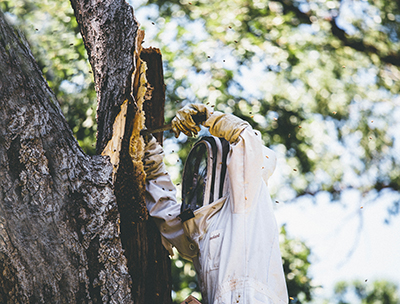FHSU swarm safely relocated after storm

07/14/16
By Diane Gasper-O'Brien
University Relations and Marketing
HAYS, Kan. -- Mike Jensen was working hard early Wednesday morning when he got a call that turned his day around.
Jensen, a Hays farmer, was busy at his dad's rental properties, cutting up fallen tree branches that had broken during an early morning storm that swept through the area.
Then, he decided to check his cell phone, and he soon had reason to smile -- even though he realized he had a lot more work ahead of him.
"I saw I had eight missed calls," said Jensen, also a local beekeeper who specializes in swarm removal.
One of those calls was from Fort Hays State University, which was looking for a swarm removal expert. A large hackberry tree on the FHSU quad had snapped in the 80 mph straight winds, and swarming around the opening was a hive of honey bees.
Jensen -- who along with his daughter, Fort Hays State sophomore Elissa Jensen, helped start the FHSU Bee Club last year -- quickly began the process of removing the bees in an effort to save them.
"This is what I like," Jensen said. "It's so educational. The more you work with bees, the more you learn about them."
With their home suddenly open to the world, the bees weren't as cooperative as Jensen had hoped.
"They were pretty irritated," Jensen said, "but then, who wouldn't be if you got your home blown apart?"
Jensen and his son, Ethan, who will be a senior this fall at Hays High School, returned Thursday morning to remove the bees.
"They kept balling back up (Wednesday), so we let them sit overnight," Jensen said. "Now, we'll screen the front, haul them off and relocate them somewhere -- and hope they survive."
Jensen said he thinks the bees have a good chance of surviving.
"If this was October, I don't know," he said. "But it's early enough. They can rebuild and make it through the winter."
Andree Brisson, Fort Hays State's sustainability coordinator, said the university is "so fortunate to have this relationship we have formed with the local beekeepers because you can call them at a time like this."
"The beauty of this," Brisson said, "is that the bees don't have to be exterminated."
Jensen Farms manages about 35 hives and also specializes in swarm removal.
"In the past, if we had found these bees, they probably would have been sprayed and exterminated," Brisson said.
Now, people know who to call -- Jensen Farms at 785-623-4285.
"The bee club has helped change the culture, made aware the importance of bees," Brisson said. "We've had a paradigm shift on campus about the awareness of bees."
As Jensen took a break from his work, he told how the bees not only had found a new home for two or three years but they extended the life of the tree in the process.
"When the trees get a bad spot and bees move in, the bees actually save the tree's life," Jensen said, explaining that the bees seal off the damaged portion.
But the life of that particular hackberry tree, as well as the lives of the bees that made it their home, all changed dramatically early Wednesday morning.
"They should be alright," said Jensen, who was also called for swarm removal of bees from three other trees in town after the storm. "We'll get them out and relocate them at least 2 miles away."
Jensen said it's not a surprise that no one apparently knew the bees were there.
"They usually look for a hole 12 to 15 feet high," he said. "They just went in, made themselves at home and started working."
Coincidentally, the FHSU Bee Club brought between 12,000 and 15,000 bees to a hive on the outskirts of the Fort Hays State campus this past spring. Little did anyone know they weren't the first bees on campus.
"To think," Jensen said, "we had Elissa's Earth Day booth 50 feet away from that tree this spring, and those bees were that close all the time."
Cutline: FHSU Bee Club members and local beekeeper worked together to relocate bees from a hackberry tree on campus that was damaged during Wednesday's storm. Photo by Jared Tadlock.